Do you know that 60% of men under 25 years old in India are facing hair loss issues? In India, hair fall is often ignored as merely a cosmetic concern, but in reality, it can be the cause of a major health condition. The good news? Minerals & Vitamin deficiency and lifestyle changes are among the many factors causing hair fall. Correcting these deficiencies & making some good choices in daily routine can make a visible difference in hair health and even skin health.
In this blog, we’ll talk about the top causes of hair fall, which vitamin deficiency causes hair loss, and lastly, the mechanism of hair formation. So that you get the whole idea!
Let’s begin.
The Top Hair Loss Causes in Males in India
It is shocking how today, 60% of men under 25 years old are facing hair loss problems—as per a study done by Traya, where they surveyed 5 lakh Indian men. That is a big number for such young males, but hair fall in males is very common.
Take a look at this bar graph to see what they found:
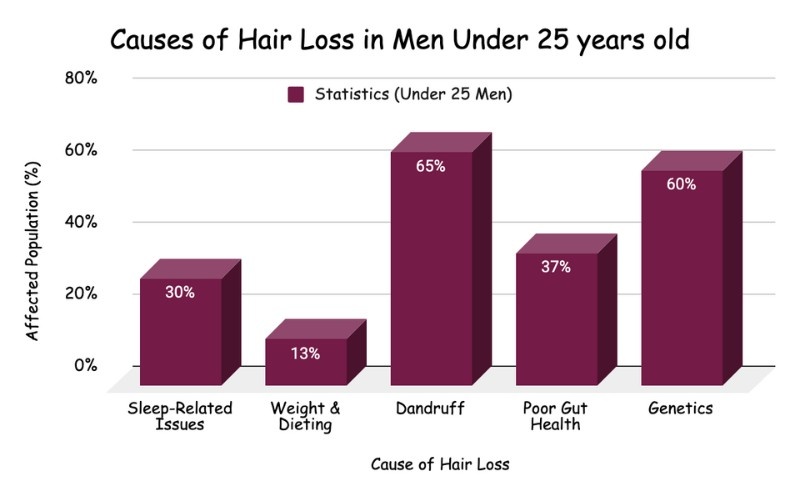
Along with genetics and dandruff, which are the main causes of hair fall in males, stress, non-nutritious diet, lack of sleep, and poor gut health also play a major role.
5 Things That Cause Hair Loss in Men
Here are the 5 hair loss causes in males as well as females:
- When Nutrients Are Missing → Hair weakens. Hairs become brittle and thin.
- When Genetics and Hormones Take Over → Pattern Hair Loss [Called Androgenetic Alopecia]
- When Mechanical Stress Adds Up → Called Traction Alopecia (when you add external stress on hairs by tight ponytails, braids, & turbans)
- When Immunity Misfires → Patchy Hair Loss (called alopecia areata)
- When Stress Pushes Hair to Rest phase →Called Telogen Effluvium. Sometimes, physical and mental stress pushes too many hairs into the resting/shedding phase at once. This results in clumps of hair falling out. It can be acute (short-lived after an event) or chronic (lasting months to years).
Which Vitamin Deficiency Causes Hair Loss?
Now, we can’t change our genes, but we can change our lifestyle to a non-stressful one and one that has complete nutrition.
Several vitamins & minerals deficiencies, especially vitamin D, B-group vitamins, iron, and zinc, are commonly linked with hair thinning and shedding. Fulfilling their shortages may help your hair grow back.
What Do Studies Say?
A very recent systematic review published in October 2024 concluded that B-group vitamins, vitamin D, iron, and zinc play very significant roles in hair growth and maintenance. They have a major function of activating the growth factors in the hair follicles, which signal the stem cells for hair growth. (Understand this in detail below.)
Deficiencies or imbalances in these vitamins & minerals can lead to male pattern hair loss (also called androgenetic hair loss) and other hair disorders.
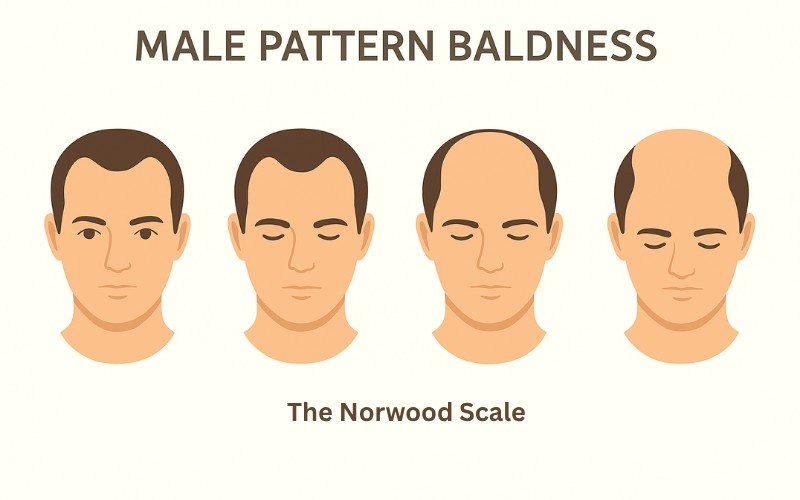
Another cross-sectional study on Indian participants published in 2017 found noticeable deficiencies in important amino acids (required to build proteins in the body) and vitamins/minerals in people with hair loss problems.
This correlation gives us the idea that nutritional deficiency is one common factor in the population having hair complaints, and it may contribute to the problem.
How Vitamin Deficiency Affects Hair Growth? (Simple Mechanism)
Here’s how these vitamins and minerals deficiencies are the reason for hair fall:
- Iron is needed to deliver oxygen to hair follicles. Low iron is linked to hair thinning.
- Vitamin D is involved in the proper hair cycle and stem cell activation (More on this below). Low levels correlate with hair loss in many studies.
- B-group Vitamins are important for keratin production (the only protein your hair is made of) and cellular functions in follicles. Severe shortage of these vitamins can make your hair brittle (easily breakable) or sparse (low volume).
- Zinc is necessary for cell division and repair. Lack of zinc in the body can cause hair shedding and slower regrowth.
The Mechanism of Hair Formation
Hair growth is controlled by blood supply, hormones, the nervous system, your age, and your diet. (Hair Physiology) It is a well-coordinated process involving three phases: Growth phase, Transition phase, and resting or shedding phase. Let me explain all these phases to you quickly.
Growth Phase
The scientific name of this phase is Anagen. In this phase, the active growth of hair takes place, cells divide and build the hair shaft. This growth phase continues for several years.
Deep in the hair follicle is a region called the bulge. This region has stem cells (master cells that can produce any cell in your body).
These stem cells transform to form keratinocytes (which produce keratin, the main protein in hair) and melanocytes (the black pigment-producing cells).
As these stem cells divide and change, the hair shaft forms, growing upwards.
What is a hair shaft? A single hair strand is called a hair shaft, which is made up of three parts: Medulla, Cortex, and cuticle. Take a look at the diagram below to easily understand this part.
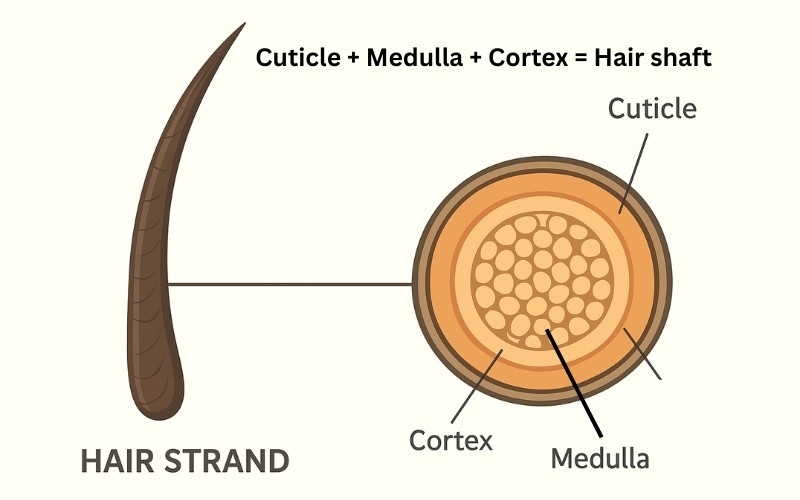
Transition Phase
This stage is known as catagen. In this phase, the growth stops. And the hair starts to thin, forming club hairs (meaning a fully grown hair ready to be shed). This phase lasts for several weeks.
Resting/ Shedding Phase
The scientific name of this phase is telogen. In this phase, the hair growth does not happen at all, and the old hairs start to fall. 10 to 15% of our hair is in this phase at any given moment. That’s why every day some hairs fall.
The cycle continuously goes on, and the switching between these phases is regulated by growth factors in the hair follicle. These factors send signals to the stem cells in the follicle and command them to grow, pause, or regress (shed).
Another interesting fact is that our hair follicles are in a special “protected status” called immune privilege. Meaning if we don’t have this immune privilege, our hair will be considered an enemy by our immune system, will get attacked, and hair loss will happen.
This is the case in Alopecia Areata (AA), where the immune system mistakenly attacks hair follicles.
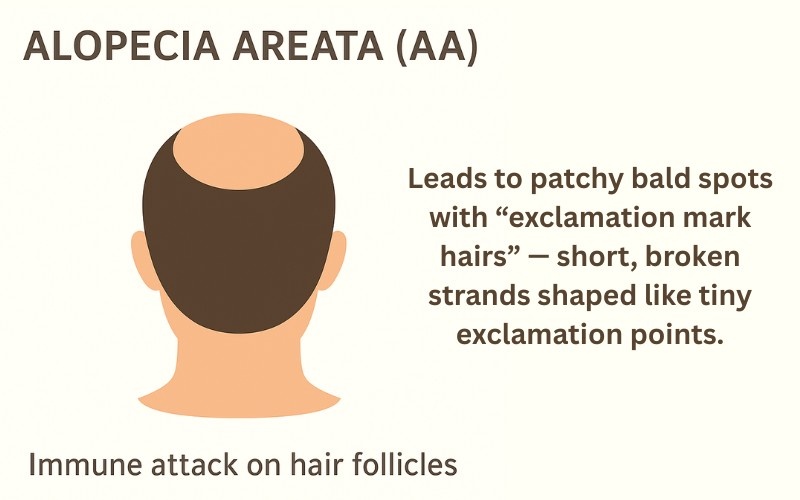
What Affects this Harmony of Hair Growth Cycle?
Many factors can disrupt this process, and the whole cycle can be thrown off. Factors involved are stress, hormonal imbalance, vitamin deficiencies, immune attacks, inadequate sleep, and genetics.
For example,
- The change from the growth phase to the transition and resting phase might happen too early. This might lead to early hair loss at a younger age. Stress can push hairs into the resting phase, leading to hair fall.
- Stem cells may fail to activate due to no growth factor activation. For growth factor activation, certain micronutrients (vitamins and minerals) are required.
- Immune privilege may break down, leading to autoimmune-related hair loss.
This is how nutritional support, hormonal balance, and good immune health are important, or say key components in maintaining normal hair growth.
Practical Tips In Treating Hair Fall Problems Caused By Vitamin Deficiency
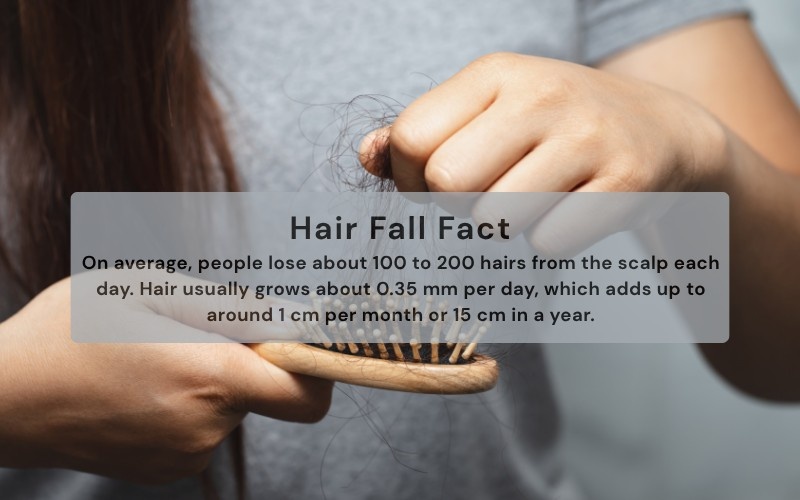
Now, let’s talk about the solution. We can stop the hair fall problem if we identify the reason for hair fall at an early stage.
First, you need to know, 100 to 200 hairs falling per day is normal. And it grows back. So, no need to panic if you see some hair fall. The problem arises when hair does not grow back.
Even in that situation, blindly taking all the supplements is not recommended. At your end, start eating a complete meal.
Include all kinds of food in your diet and try to meet the needs from a balanced diet:
- Green vegetables
- Jaggery
- Peanuts, Almonds, Raisins, Dates
- Seeds (chia, flax, pumpkin seeds—all kinds of seeds. You can get a bottle of all-seed mix from the market, which you can eat one spoonful a day.
- Milk
- Protein (pulses, sprouts, raw cheese)
- Seasonal Fruits, etc
Get your blood checked for serum ferritin, vitamin D, B12, magnesium, and zinc. Consult with a doctor and confirm the reason for hair fall.
If lab tests are normal but hair loss continues, consult a dermatologist or a trichologist to look for other causes like stress/ telogen effluvium (TE), autoimmune causes, medications, and androgenetic male pattern hair loss.
Final Thoughts
Vitamins and minerals are required in very small quantities, but their impact on our body is huge, especially on our hair. By understanding how hair grows, we realize just how significant these micronutrients are for the proper functioning of the process.
In today’s fast-paced lifestyle, stress, inadequate sleep, and unhealthy diets do not allow the body to have the nutrition it requires. The silver lining is that hair fall caused by vitamin deficiency isn’t permanent and can be reversed by the right diet & care.
So, listen to your body. Everything is a sign. Nourish your body well in & out, and let your hair thrive naturally.
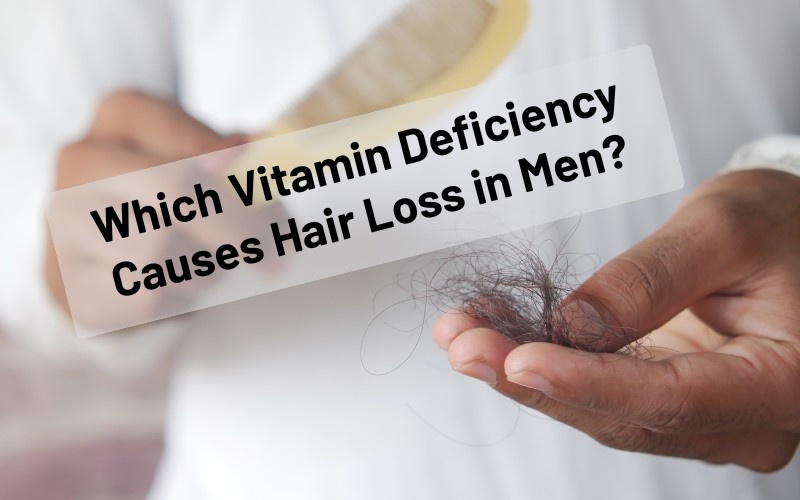



Post Comment